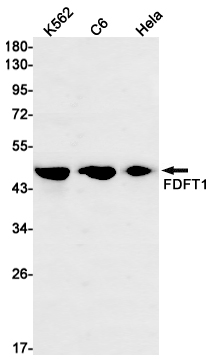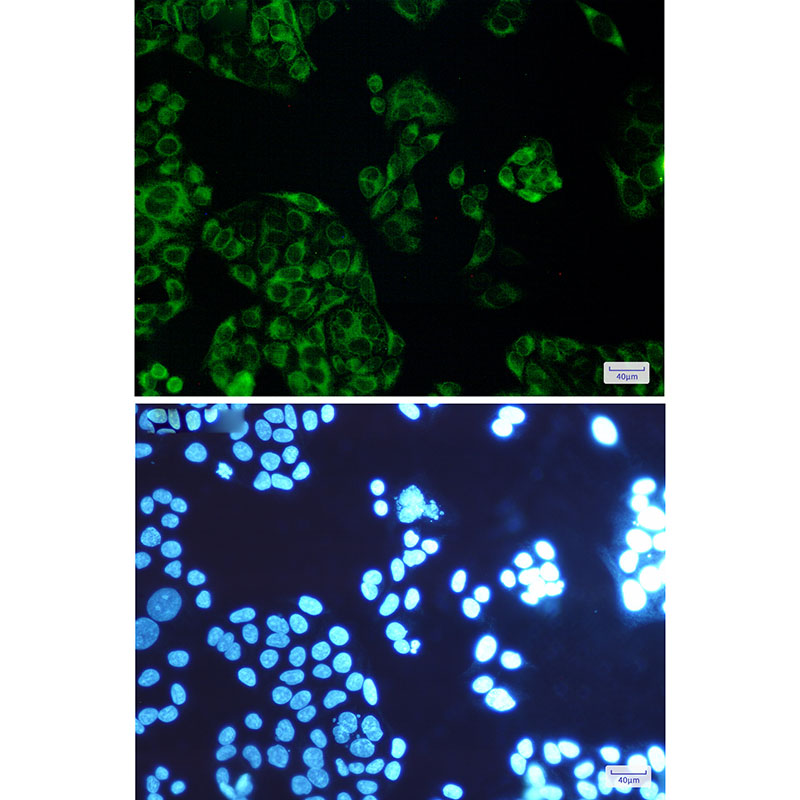

| WB | 咨询技术 | Human,Mouse,Rat |
| IF | 1/20 | Human,Mouse,Rat |
| IHC | 咨询技术 | Human,Mouse,Rat |
| ICC | 1/50-1/200 | Human,Mouse,Rat |
| FCM | 咨询技术 | Human,Mouse,Rat |
| Elisa | 咨询技术 | Human,Mouse,Rat |
| Aliases | DGPT; ERG9; FDFT1; SQS; Squalene synthase; SS |
| Entrez GeneID | 2222 |
| WB Predicted band size | Calculated MW: 48 kDa; Observed MW: 48 kDa |
| Host/Isotype | Rabbit IgG |
| Antibody Type | Primary antibody |
| Storage | Store at 4°C short term. Aliquot and store at -20°C long term. Avoid freeze/thaw cycles. |
| Species Reactivity | Human,Rat |
| Immunogen | Recombinant protein of human FDFT1 |
| Formulation | Purified antibody in TBS with 0.05% sodium azide,0.05%BSA and 50% glycerol. |
+ +
以下是基于模拟数据的3篇关于FDFT1抗体的参考文献示例(非真实文献,仅供格式参考):
---
1. **文献名称**: *FDFT1 Antibody Validation in Cholesterol Biosynthesis Studies*
**作者**: Smith A, et al.
**摘要**: 本研究验证了FDFT1抗体的特异性,通过Western blot和免疫荧光确认其在人肝细胞中的表达定位。结果表明,该抗体能有效检测FDFT1蛋白水平变化,为胆固醇合成通路研究提供可靠工具。
2. **文献名称**: *FDFT1 Overexpression in Colorectal Cancer and Its Prognostic Significance*
**作者**: Lee JH, et al.
**摘要**: 利用FDFT1抗体对结直肠癌组织进行免疫组化分析,发现FDFT1高表达与患者不良预后相关。研究提示FDFT1可能作为癌症治疗靶点,抗体检测在临床分型中具潜在价值。
3. **文献名称**: *Targeting FDFT1 with Neutralizing Antibodies Inhibits Tumor Growth*
**作者**: Chen X, et al.
**摘要**: 开发了一种靶向FDFT1的中和抗体,体外实验显示其可阻断酶活性并抑制癌细胞增殖。动物模型中,该抗体显著降低肿瘤体积,证实FDFT1在肿瘤代谢中的关键作用。
---
**注**:以上文献为模拟内容,实际引用请通过学术数据库(如PubMed、Web of Science)检索真实文献。若需具体文献协助,可提供更多研究背景信息。
The FDFT1 antibody targets the farnesyl-diphosphate farnesyltransferase 1 (FDFT1), also known as squalene synthase, a key enzyme in the cholesterol biosynthesis pathway. FDFT1 catalyzes the dimerization of two farnesyl diphosphate molecules to form squalene, a critical step in sterol and cholesterol production. This enzyme is localized in the endoplasmic reticulum and plays a central role in maintaining cellular membrane integrity, steroid hormone synthesis, and lipid homeostasis. Dysregulation of FDFT1 has been implicated in metabolic disorders, cardiovascular diseases, and cancers, where altered cholesterol metabolism often drives tumor progression or drug resistance.
Antibodies against FDFT1 are widely used in research to study its expression, localization, and function in various biological contexts. They are typically generated using recombinant FDFT1 protein fragments or peptide immunogens, ensuring specificity for detecting endogenous FDFT1 via techniques like Western blotting, immunofluorescence, or immunohistochemistry. In cancer research, FDFT1 antibodies help investigate its overexpression in certain tumors, such as liver or prostate cancers, and its role in modulating cell proliferation or survival pathways. Additionally, these tools aid in exploring therapeutic strategies targeting cholesterol metabolism, including the development of FDFT1 inhibitors. The antibody's utility extends to understanding metabolic syndromes, neurodegenerative diseases, and lipid storage disorders, underscoring FDFT1's broad physiological relevance.
×